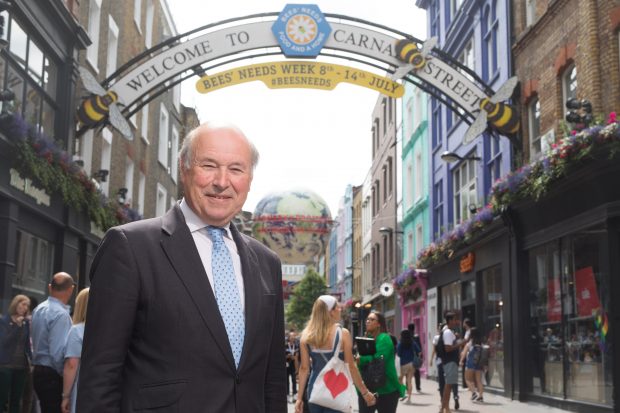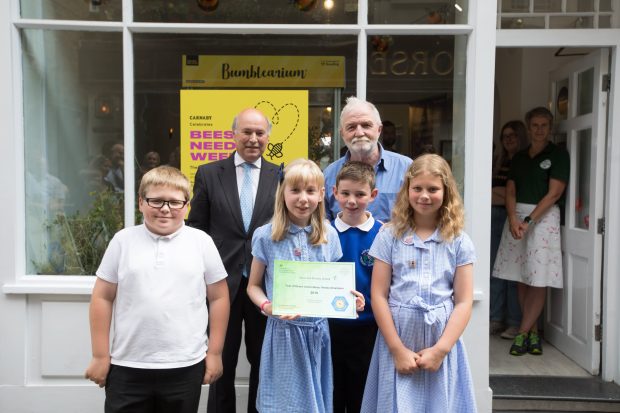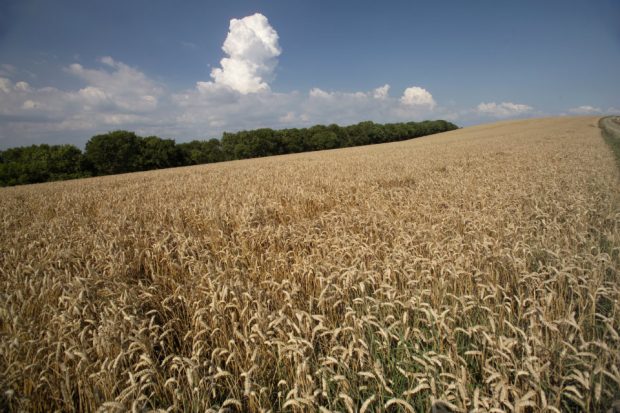
Bees’ Needs Week returns and Countryside Productivity Small Grants scheme funding
Written by Defra Press Office

PA
Bees’ Needs Week returns with a hive of activity in central London
The buzz at the launch of Bees’ Needs Week 2019 on Carnaby Street was covered on BBC London Radio, London Live and BBC News (London).
The annual Defra coordinated campaign returns to Carnaby Street between 8-14 July. The world famous street has been transformed and renamed ‘Carnabee’ Street ‘ to celebrate Bees’ Needs Week and promote the importance of collective action in helping protect our pollinating insects.
Lord Gardiner, Minister for Biosecurity, said:
I am immensely grateful to Shaftesbury for its continued commitment to raising awareness of pollinating insects by renaming their famous shopping destination ‘Carnabee Street’ for the second year running. Not only do bees and other pollinators contribute the equivalent of more than £500 million a year to UK agriculture and food production, they are vital to our ecosystem.
Bees’ Needs Week urges us to do simple things such as growing more flowers and shrubs, cutting grass less often and thinking carefully about whether to use pesticides. As 2019 marks the Year of Green Action, I would encourage everyone of all ages to find new ways to connect with nature and protect our environment.
Visitors to Carnabee Street will be able to get up close to the bee action at the ‘Hive’ a pop-up on 3 Newburgh Street where there is a live Bumblearium from the University of Reading, and observation bumblebee colony from the University of East Anglia and bee-enthusiasts will be able to experience what it’s like in a colony thanks to VR headsets from Kew.
At the launch on Monday 8 July, four impressive schools were awarded the Bees’ Needs School Champion Award by Lord Gardiner and George McGavin, environment ambassador for the Year of Green Action and entomologist.

PA
The schools were recognised for their work helping pollinator numbers and raising awareness of the importance of pollinating insects. Their efforts ranged from making bracelets to fundraise to buy pollinator friendly plants for the school grounds to becoming junior beekeepers certified by the British Bee Keepers Association.
Lord Gardiner, Minister for Biosecurity, said of the award winners:
Pollinating insects are an essential part of our lives as they provide the food we eat and also contribute to our beautiful landscapes.
Raising awareness of what we all can do to help pollinators is essential and I hope these outstanding children will inspire others to do the same and do their bit to help this Year of Green Action.
Year of Green Action Ambassador George McGavin said:
I'm hugely encouraged to see such a high level of engagement from the next generation of bee champions.
Children understand about environmental issues better than most adults - they know their future depends on it.
If you start out understanding the importance of bees there's a good chance things will get better.

This morning the news of the second round of funding for the popular Countryside Productivity Small Grants scheme was on the front page of the Yorkshire Post and has since been covered in Farming UK.
From today, farm businesses can apply for grants of between £3,000 and £12,000 to help them invest in new and innovative technology. Grants are available for all farm types, including livestock, horticulture and arable businesses, with a total pot of £15 million available to fund investments in new technology.
The first round of funding opened in 2018, when £15 million was awarded to successful applicants.
For the second round of funding, 26 new items have been added to the list of equipment available, including chlorophyll meters, which instantly measure the chlorophyll content of a plant leaf. Another new item is the portable ammonia analyser, which can be used to check the levels of ammonia in farm buildings. Farmers and rural businesses will have eight weeks to submit an application for this funding.
The NFU has responded to say they are “pleased that that the list of equipment available for farmers to invest in, such as GPS systems for precision farming, has increased” and that “Schemes like this are hugely valuable because they help boost productivity, while maintaining the same level of inputs. This then creates the margin that enables farmers to re-invest in their businesses.”
Farming Minister Robert Goodwill said:
The small grants scheme proved to be so popular in the first round because it gives farmers access to equipment that can deliver quick and tangible improvements.
This isn’t just about increasing yields; it’s also about using the best tools and equipment that can improve animal welfare and the environment, such as monitoring the levels of nitrogen in crops.
As we leave the EU we want more farmers to be able to invest in this kind of technology that can boost the bottom line and make a real difference.
Follow Defra on Twitter, and sign up for email alerts here.
Continue reading on Defra Website...





